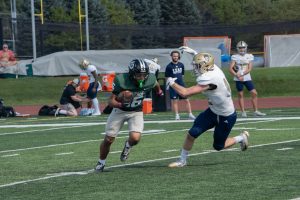What is next for the SLC?
April 13, 2016
Student leadership entails working on qualities needed to become a good leader in a diverse community, engaging in social activities that bring the entire student community together, brainstorming projects that can have impact on the student community and the public at large, sacrificing valuable time for work associated with a particular position and volunteering with the objective to have a far-reaching effect from the activities volunteerism bring about.
These are basic values that are visible within the Student Leadership Council (SLC). Successes from recent activities like The Pulsera Project, SLC Popcorn Tabling, I Am An Ally Campaign,volunteering at Belmont Village Nursing Home, Hunger Banquet and an outstanding display of service during the New Student Orientation events in mid-January, are evidence of the aforementioned attributes of student leadership. But in my mind, I feel the Student Leadership Council isn’t effective to a fuller extent.
Brendon Burchard, author of The Student Leadership guide, mentioned three principles of effective student leadership, namely: “Leadership is a collective, not singular, activity,” “Leadership is not management” and “Leadership is rooted in service.” So far, the Student Leadership Council has been excellent when it comes to carrying out principles two and three. Their non-coercive leadership style, dedicated service and their great working relationships with campus based clubs must not go unnoticed. Brendon Burchard stated that the three principles must work together.
At present, the Student Leadership Council has failed over the years to make leadership a collective and non-singular activity. The March 15 and 16 elections that saw nine candidates aspire to fill three significant positions, Student Trustee, President and Vice President, is a glaring manifestation of a critical facet of student leadership (“Leadership is a collective, not singular, activity”) that must be worked on now.
The results verified by Diana Aspuria, Stephanie Quirk and Keith Zeitz, showed that only 525 students voted from College of DuPage, the second largest provider of undergraduate education in the State of Illinois, with a population of over 28,000 students who are all qualified to participate in the student elections.
This appalling figure definitely suggests, without any creation of doubt, that the Student Leadership Council is not collective. In a survey carried out by The Courier in its March 16, 2016 Volume 50 – Issue 22 edition, students aren’t aware of the existence of an office called SLC or its activities. Three students were interviewed and not a single person knew anything about the elections. Yet they all check their student emails for messages from administration or a teacher. Is this a collective leadership? A resounding no!
I am aware of the difficulties associated with young people, who make up the bulk of the student’s population, and politics, but officers must find a way to get them involved. The elections on April 12 by SLC members for officers to fill outreach, operations and service roles must be used as an evaluation opportunity to find the right candidates to push this all important agenda, “Get Students involved.”
As students, we often look to our leaders to shed the responsibility for us, and place unambiguous trust in a person we feel is an agent of change, or is just qualified to serve as a leader. But this thinking cannot be realized when we fail to participate in campus activities and become abreast with issues on campus, let alone opening a computer to vote electronically for our student leaders.
We all know the days that school won’t be in session due to incessant snow and slippery roads. We all know the days that the internet connectivity is down on campus caused by technological breakdown. We all know the last day of school and we are planning long vacations with our friends, loved ones and families. The date of our next exam is in our mind when we perform poorly on a preceding one, and we all master the parking lot and are upset when what we view as a usual spot isn’t vacant. Yet the cruel irony is we don’t know about how the Student Leadership Council (SLC) leaders are elected, neither do we participate in their activities. They represent and speak for us. So why won’t we be elated to work with them?
Again Brendon Burchard, whose leadership guide I admire and lived by as a former student leader, ended the first principle of his three student leadership principles like this, “This means we, as students, have to become proactive and accountable. It means we have to use the term “collaborators” because our efforts are collective. It means we have to understand everything we do, or do not do, impacts everyone else. It means we can no longer look to singular commanders, but rather to communities of shared responsibility and accountability. Communities that we have shaped, encouraged, and emboldened with common values, principles, and purposes.”



















